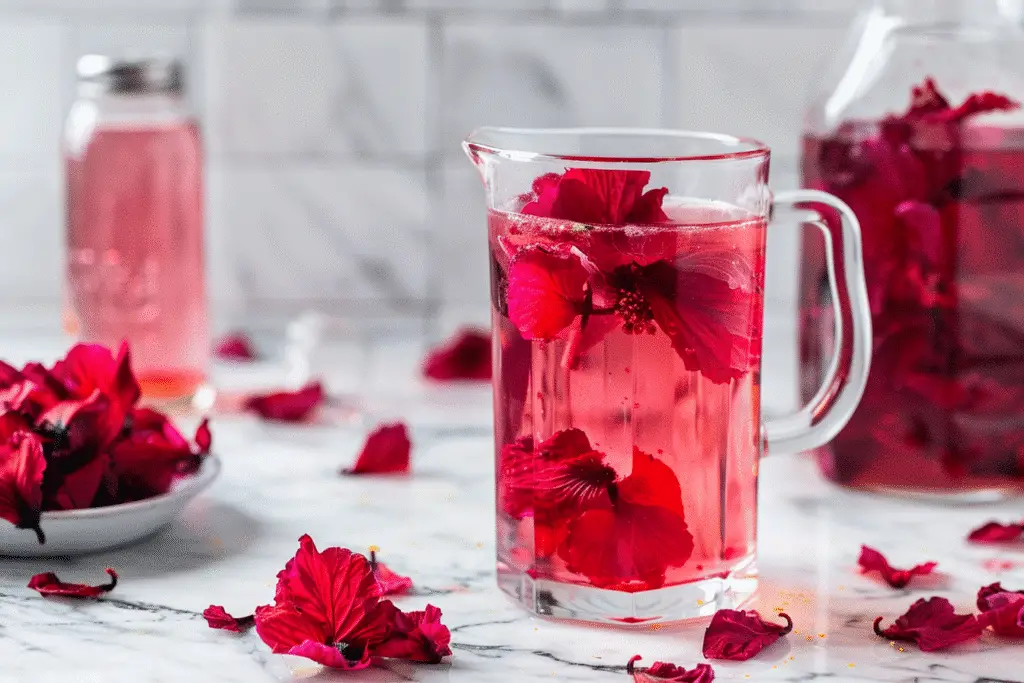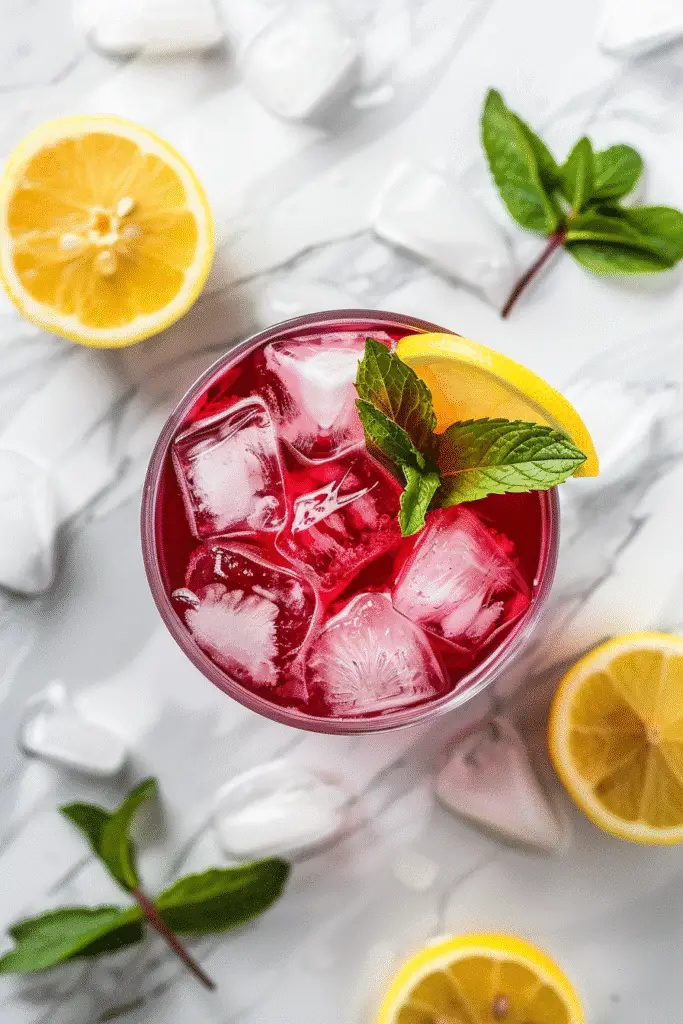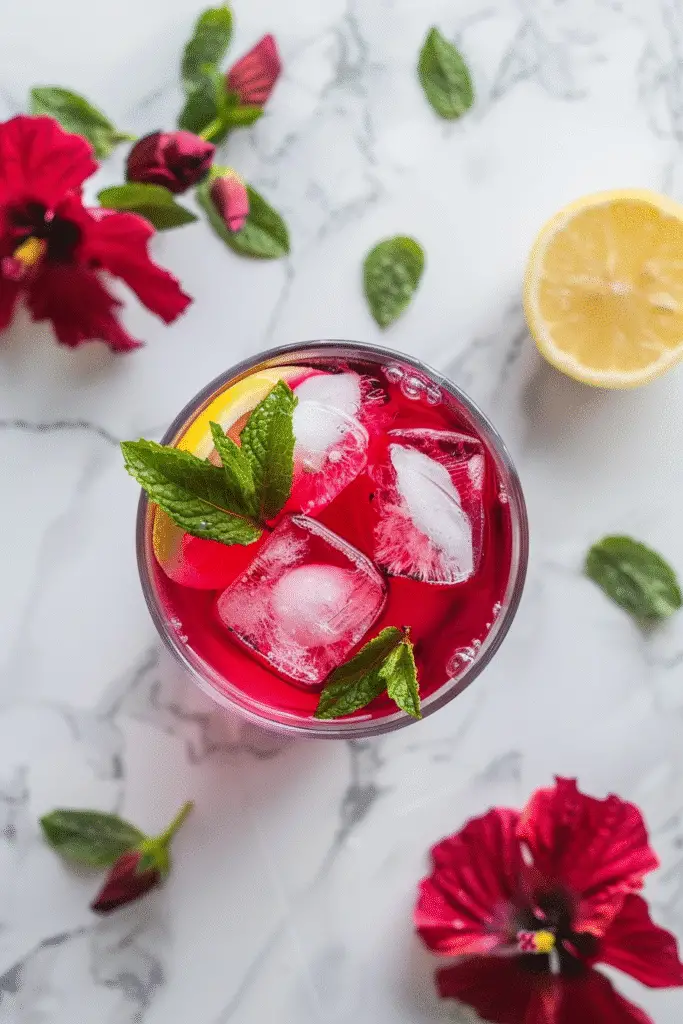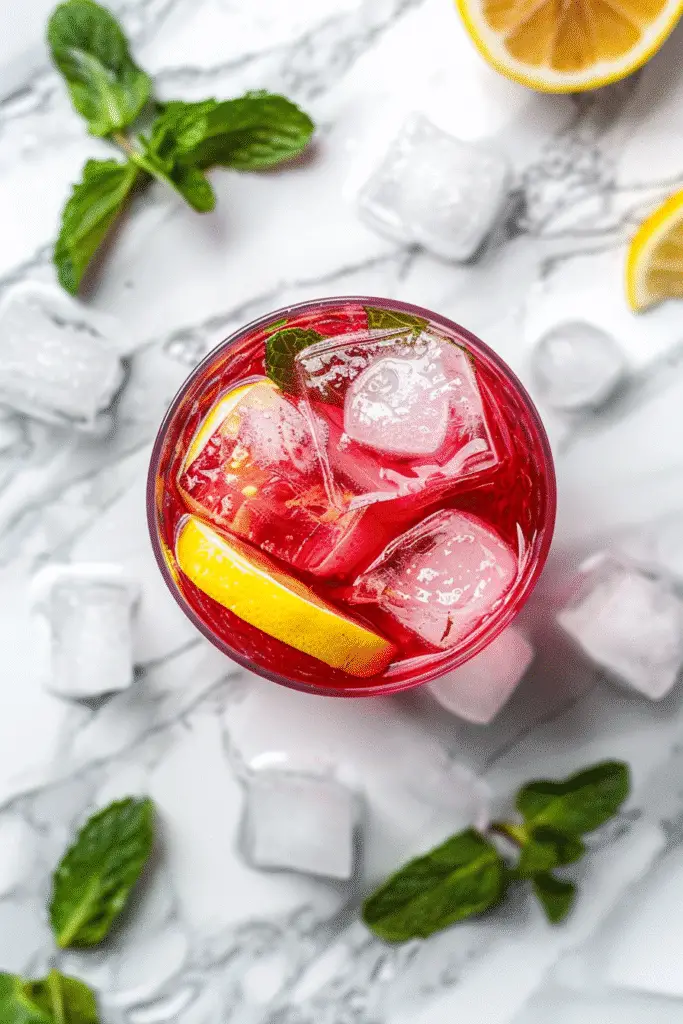Hibiscus water benefits aren’t just a wellness trend—they’re rooted in centuries of traditional medicine and now supported by modern research. Known as agua de Jamaica in Mexico, this ruby-red drink is as vibrant in flavor as it is in health perks. Packed with antioxidants, vitamins, and minerals, hibiscus water offers natural support for your heart, brain, gut, and even your kidneys.

If you’re already exploring healthy drinks like ginger water with chia seeds or apple cider vinegar tonics, hibiscus water deserves a permanent spot in your hydration routine.
Hibiscus water is a chilled, lightly sweetened herbal infusion made from hibiscus petals. It’s rich in vitamin C, flavonoids, and anthocyanins that:
- Support heart and kidney health
- Boost brain function and immunity
- Reduce inflammation and aid gut health
- Help with weight management and seasonal allergies
Simple to make and naturally refreshing, hibiscus water is a wellness powerhouse in a glass.
Table of Contents
Hibiscus Water Supports Heart Health
Your heart loves hibiscus water as much as your taste buds do. Thanks to its high concentration of antioxidants like anthocyanins and flavonoids, this floral drink may help lower LDL cholesterol—the so-called “bad” cholesterol—and keep your arteries more flexible. Researchers also note hibiscus can naturally relax blood vessels (vasodilation), which supports healthy blood pressure.
Unlike sugar-heavy sodas, hibiscus water is both hydrating and heart-friendly. Pair it with a light meal such as ribbon carrot salad for a nutrient-rich combo that nourishes your cardiovascular system.
Quick takeaway: Regularly sipping hibiscus water could be a simple, tasty way to reduce risk factors linked to heart disease.

Hibiscus Water May Improve Brain Health
A healthy brain thrives on circulation and protection from oxidative stress—and hibiscus water offers both. Its anthocyanins act as natural anti-inflammatories, helping reduce the kind of silent inflammation that contributes to cognitive decline. Another key player, quercetin, is linked to neuroprotective effects and may slow down the progression of neurodegenerative conditions like Alzheimer’s disease.
Some animal studies even suggest hibiscus can improve short-term memory, making it a gentle ally for focus and mental clarity. Pairing hibiscus water with memory-supporting foods—like antioxidant-packed beetroot juice with chia seeds—could be a brain-boosting ritual worth adopting.
Quick takeaway: Hibiscus water’s blend of flavonoids makes it a refreshing way to nurture long-term brain health.
Hibiscus Water Boosts the Immune System
A single glass of hibiscus water delivers a powerful antioxidant punch. Vitamin C teams up with flavonoids and phenolic compounds to strengthen your body’s natural defenses. Together, they fight free radicals, lower inflammation, and create an internal environment where your immune system can thrive.
For those prone to seasonal sniffles or colds, hibiscus water can be a gentle ally. Its protective compounds support resilience while its tangy flavor makes it a far more exciting alternative to plain water. Pairing it with foods from your daily diet—like fresh natural weight loss recipes packed with fruits and vegetables—will double up on immune support.
Quick takeaway: Hibiscus water acts like a natural shield, keeping your immune system strong and ready to fight off everyday challenges.
Hibiscus Water May Improve Gut Health
Your digestive system also reaps rewards from hibiscus water. The anthocyanins in hibiscus help protect the stomach lining and may reduce the risk of gastric ulcers—making it a natural, soothing option compared to some harsh over-the-counter remedies.
Even more exciting, hibiscus supports a balanced gut microbiome. Its bioactive compounds help nourish beneficial bacteria while calming inflammation in the digestive tract. Over time, this can mean smoother digestion, less bloating, and stronger gut resilience.
For a complete gut-friendly combo, try pairing hibiscus water with fermented or fiber-rich foods. A glass alongside overnight oats or a veggie-packed dish like ginger water with chia seeds can amplify digestive wellness.
Quick takeaway: Hibiscus water keeps your gut lining strong, supports healthy bacteria, and promotes smoother digestion.
Hibiscus Water May Help With Weight Management
If you’re looking for a flavorful alternative to soda or artificially flavored waters, hibiscus water is a smart choice. Naturally low in calories (when made with minimal sweetener), it delivers hydration without the sugar crash. That makes it a supportive ally for anyone trying to manage or reduce weight.
Some research even suggests hibiscus extracts may influence fat metabolism and help regulate appetite—though studies are still ongoing. At the very least, swapping sugar-laden drinks for hibiscus water is a small habit shift that pays off in the long run.
For added benefit, combine hibiscus water with light, filling meals like fresh produce or natural weight loss recipes. It keeps your daily choices aligned with your health goals while still feeling indulgent.

Quick takeaway: Hibiscus water offers a refreshing, waistline-friendly option for staying hydrated and supporting healthy weight habits.
Hibiscus Water May Alleviate Allergies
For seasonal allergy sufferers, hibiscus water might offer gentle relief. The plant’s compounds can stabilize mast cells, which are responsible for releasing histamine—the chemical that triggers sneezing, watery eyes, and itchy skin. By calming down this overactive response, hibiscus may help ease allergy symptoms before they start.
Herbalists often recommend sipping hibiscus water a few weeks ahead of allergy season as a preventive strategy. Think of it as preparing your body’s defenses early. Even if you drink it reactively, its anti-inflammatory and immune-balancing effects can still bring comfort.
Pair hibiscus water with nutrient-packed meals like a fresh ribbon carrot salad to boost your body’s resilience against environmental triggers.
Quick takeaway: Hibiscus water’s natural antihistamine effect may reduce seasonal discomfort, making it a soothing, functional drink for allergy-prone individuals.
Hibiscus Water May Support Kidney Health
Your kidneys work tirelessly to filter toxins, balance fluids, and regulate electrolytes. Hibiscus water provides gentle support for these vital organs. Studies suggest hibiscus may improve markers like blood urea nitrogen (BUN) and protein levels in urine, indicating protective effects on kidney function.
Its mild diuretic action helps the body flush excess sodium and waste, keeping the urinary tract clean and potentially lowering the risk of infections. In some research, hibiscus even outperformed common medications in promoting urine output and filtration.
Pairing hibiscus water with hydrating, whole foods—like fruits, leafy greens, or apple cider vinegar tonics—can further support kidney health and overall detox pathways.
Quick takeaway: Hibiscus water acts as a natural kidney ally, promoting healthy filtration, balanced hydration, and urinary tract wellness.

Conclusion
Hibiscus water benefits stretch far beyond its bold, ruby color and tangy flavor. From supporting heart and brain health to strengthening immunity, soothing digestion, and even protecting kidneys, this herbal infusion is a simple daily upgrade to your wellness routine.
If you’re already experimenting with healthy sips like beetroot juice with chia seeds or browsing natural weight loss recipes, adding hibiscus water into the mix is a no-brainer.
Your turn: Have you tried hibiscus water yet? Share your experience in the comments, or spread this guide with a friend who might need a refreshing new health ritual.
For more health recipes, follow us on Best True Homemade on Facebook and How To Cook Today on Pinterest
FAQs
Is hibiscus water better than tea?
Both hibiscus tea and hibiscus water provide similar benefits. Tea is served hot, while water is chilled and often sweetened, making it more refreshing during warm weather.
Does hibiscus water have side effects?
Most people tolerate it well, but in large amounts, it may lower blood pressure or interact with certain medications. Always introduce it slowly and listen to your body.
Can you drink hibiscus water every day?
Yes, in moderate amounts. A daily glass can support hydration and wellness, but if you’re on medication for blood pressure or diuretics, check with your healthcare provider first.
How do you make hibiscus water at home?
Boil dried hibiscus petals (or a few hibiscus tea bags), let them steep for about 2 hours, strain, chill, and sweeten lightly with honey or sugar if desired. Mix with water to adjust flavor and serve cold.
